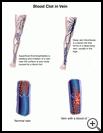
Superficial Thrombophlebitis
________________________________________________________________________
KEY POINTS
- Superficial thrombophlebitis is swelling and irritation of a vein near the surface of your body caused by a small blood clot.
- You may need anti-inflammatory medicine, warm, moist compresses on the inflamed area, and compression stockings.
- Your healthcare provider will tell you what kinds of physical activity are safe for you as you heal.
________________________________________________________________________
What is superficial thrombophlebitis?
Superficial thrombophlebitis (ST or SVT) is swelling and irritation of a vein near the surface of your body caused by a small blood clot. It is often in the arm or leg.
What is the cause?
A clot may form in a vein because blood flow in the vein slows down or stops. This may happen after:
- Injury to the vein, such as a bruise
- An IV (medicine or fluid given through a vein)
Often a clot develops in varicose veins, usually in the leg or arm. Varicose veins are enlarged veins close to the surface of the skin.
Things that increase your risk for blood clots also increase your risk for ST. For example:
- Blood clotting disorders that you are born with
- Pregnancy and delivery
- Infections
- Certain cancers
- Sitting or standing for long periods or continued bed rest
- Taking birth control pills or hormone replacement therapy
- Surgery especially orthopedic surgery or surgery in the pelvic area
- Varicose veins
What are the symptoms?
Symptoms may include:
- A tender cordlike vein that is very sensitive to touch or pressure
- Redness, warmth, and swelling in the area around the vein
How is it diagnosed?
Your healthcare provider will ask about your symptoms and medical history and examine you. You may have an ultrasound or X-ray to check for clots in deeper veins, which are more serious than problems with the veins near the surface of your skin. Often, no tests are needed.
How is it treated?
Your healthcare provider may recommend that you:
- Take an anti-inflammatory drug, such as aspirin or ibuprofen. Nonsteroidal anti-inflammatory medicines (NSAIDs), such as ibuprofen and aspirin, may cause stomach bleeding and other problems. These risks increase with age. Read the label and take as directed. Unless recommended by your healthcare provider, do not take for more than 10 days.
- Put warm, moist compresses on the inflamed area. Be careful to avoid burns. If you are using a heating pad, do not lie on it or fall asleep with it plugged in.
- Keep your legs up above your heart as much as possible when you sit or lie down.
Your provider may prescribe a blood thinner medicine, especially if you are at increased risk for developing a blood clot in a deep vein.
Unless you have a lot of pain, your healthcare provider may tell you stay active to avoid the superficial clot becoming a deep clot, which is a much more serious problem.
With proper treatment, ST usually lasts 1 to 2 weeks. In rare cases, the vein may get infected. If this happens, you may need to take antibiotics, or have a procedure to treat or remove the vein.
How can I take care of myself?
Follow the full course of treatment prescribed by your healthcare provider. Ask your provider:
- How and when you will get your test results
- How long it will take to recover
- If there are activities you should avoid and when you can return to your normal activities
- How to take care of yourself at home
- What symptoms or problems you should watch for and what to do if you have them
If you have varicose veins, ask your healthcare provider if you should wear special support stockings. Ask what type of stockings you may need, when you should start using them, and how often you should wear them.
Make sure you know when you should come back for a checkup. Keep all appointments for provider visits or tests.

